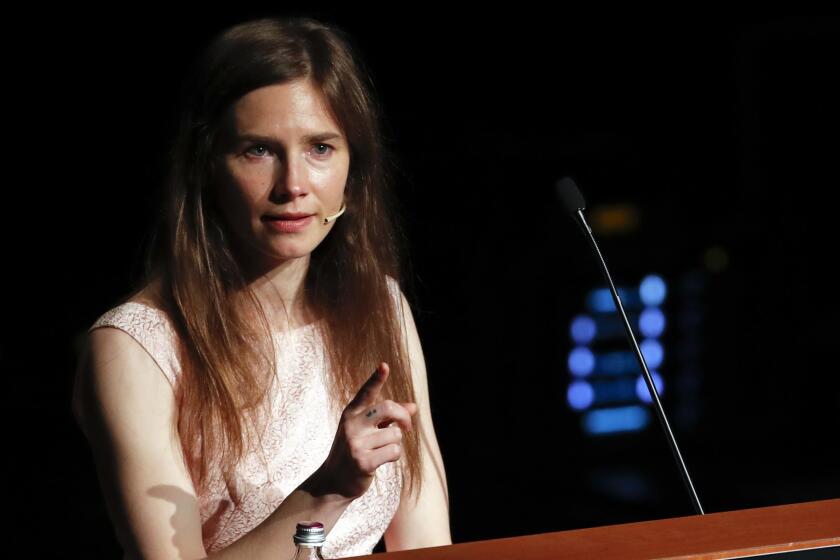BOOK REVIEW : The Great but Subtle Powers of Women : FRAUD, By Anita Brookner , Random House $21; 263 pages
- Share via
Anna Durrant has a recurring dream in which she sits before a slice of very rich cake. She takes up her fork and plunges it into the cake, which immediately falls apart to reveal a wedding band.
“Time and again,” writes Anita Brookner, Anna “heard the ring clatter on the plate, while the cake, uneaten, vanished into thin air, its purpose achieved. It was somehow important not to eat the cake for fear of swallowing and therefore missing the ring.”
Anna, as a result, is unhealthily thin, this fairy-tale dream causing her to consume food “cautiously, sometimes renouncing it altogether.”
This passage, which occurs early on in “Fraud,” is more than a little disheartening, for it intimates that Brookner has launched headlong into cliche.
The art historian and Booker-winning novelist (for “Hotel Du Lac”) has written many thoughtful, closely observed novels portraying the lives of shy, solitary women, but what character is more stereotypical than the spinster--Anna is in her 50s--who fantasizes about a sudden marriage proposal?
Anna, in the description just quoted, seems not merely traditional but shallow, even her unconscious having succumbed to an identity-erasing man-centered view of the world.
As it turns out, however, the misapprehensions created by this passage are unfounded. Although it’s true that Anna regrets her failure to marry, Brookner doesn’t refer to the cake dream again and places women, rather than women’s images of men, at the heart of “Fraud.”
Moreover, the men in this novel are developed characters--they range from exploitive to passive, adolescent to bullying--of only secondary importance, their power as doctors, soldiers and globe-trotting businessmen largely limited to the physical world.
Women, here, have a greater, typically more subtle power, with Anna’s life shaped less by men and society at large than by individual expectations.
Anna has suffered most from the expectations of her mother, Amy. But Amy is no monster: a widow, she is alone and simply assumes that Anna, an only child, is duty-bound to take care of her sole remaining parent, even if it means that Anna will never learn to respect her own needs, to have a life of her own.
Anna and Amy truly love one another but, as Brookner writes, “they had loved one another despairingly: that was their undoing.” Anna believes herself content to follow her mother’s wishes, but when Amy dies--at a ripe old age and after an ill-fated love affair Anna finds both offensive and embarrassing--Anna begins to realize what she has missed.
“Fraud” begins with Anna’s disappearance, a shrewd opening that allows Brookner to catalogue the surprised reactions that disappearance evokes among Anna’s handful of acquaintances. Lawrence Halliday, a doctor and Anna’s only potential suitor in the past, has opened an investigation by calling the police to report Anna missing: Anna has failed to appear for a number of appointments, he tells the authorities, “something she would never dream of doing.”
Mrs. Marsh, an aged friend of Amy to whom Anna transferred her habit of devotion, believes Anna was “terrified of being alone” and is too “level-headed” to be missing.
Halliday and Marsh are not alone in misperceiving Anna and her potential but can be excused to some degree by virtue of the fact Anna misperceived herself, living as she did in furious denial that there should be more to life than the fulfilling of duty.
Anna has spent most of her life becoming, as she tells an acquaintance at one point, “what people wanted me to be, without their ever asking me what I myself would have wanted. . . . They fashioned me in their own image, according to their needs.”
That is Anna’s epiphany, the very small sort of epiphany in which Brookner specializes. There’s more to “Fraud” than that minor climax, however, for we have spent enough time with the other characters in the novel--Halliday’s socially ambitious wife, Amy’s seductive second husband, Marsh’s middle-aged children and her annoying, pragmatic housekeeper--to see that fraud and denial infect most relationships, regardless of gender or generation.
Fraud and denial, often yoked together, are indeed everywhere in life, and it takes a novel like this to show just how pervasive they are. “Fraud” sneaks up on you, delivering less than it promises in terms of mystery but more in terms of insight.
More to Read
Sign up for our Book Club newsletter
Get the latest news, events and more from the Los Angeles Times Book Club, and help us get L.A. reading and talking.
You may occasionally receive promotional content from the Los Angeles Times.










